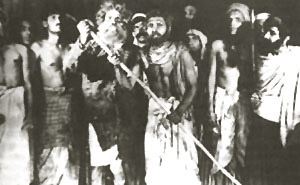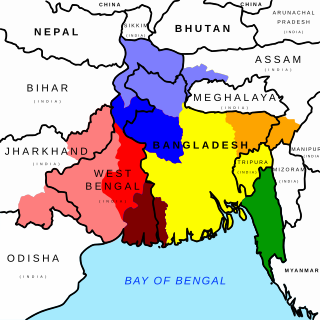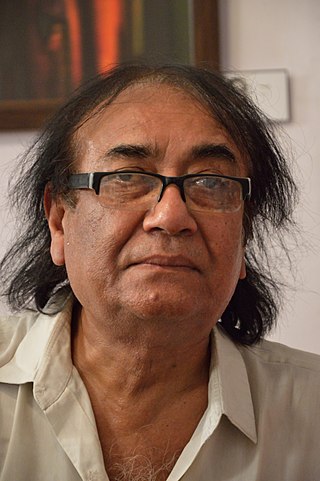Related Research Articles

Hemanta Mukhopadhyay, known professionally as Hemant Kumar and Hemanta Mukherjee, was a legendary Indian music director and playback singer who primarily sang in Bengali and Hindi, as well as other Indian languages like Marathi, Gujarati, Odia, Assamese, Tamil, Punjabi, Bhojpuri, Konkani, Sanskrit and Urdu. He was an artist of Bengali and Hindi film music, Rabindra Sangeet, and many other genres. He was the recipient of two National Awards for Best Male Playback Singer and was popularly known as the "voice of God".

Utpal Dutt was an Indian actor, director, and writer-playwright. He was primarily an actor in Bengali theatre, where he became a pioneering figure in Modern Indian theatre, when he founded the "Little Theatre Group" in 1949. This group enacted many English, Shakespearean and Brecht plays, in a period now known as the "Epic theatre" period, before it immersed itself completely in highly political and radical theatre. His plays became an apt vehicle for the expression of his Marxist ideologies, visible in socio-political plays such as Kallol (1965), Manusher Adhikar, Louha Manob (1964), Tiner Toloar and Maha-Bidroha. He also acted in over 100 Bengali and Hindi films in a career spanning 40 years, and remains most known for his roles in films such as Mrinal Sen’s Bhuvan Shome (1969), Satyajit Ray’s Agantuk (1991), Gautam Ghose’s Padma Nadir Majhi (1993) and Hrishikesh Mukherjee's breezy Hindi comedies such as Gol Maal (1979) and Rang Birangi (1983). He also did the role of a sculptor, Sir Digindra Narayan, in the episode Seemant Heera of Byomkesh Bakshi on Doordarshan in 1993, shortly before his death.

Jatra is a popular folk-theatre form Odia,Bengali theatre, spread throughout most of Odia, Bengali speaking areas of the Indian subcontinent, including Bangladesh and Indian states of Odisha, West Bengal, Assam and Tripura As of 2005, there were some 55 troupes based in Calcutta's old Jatra district, Chitpur Road, and all together, jatra is a $21m-a-year industry, performed on nearly 4,000 stages in West Bengal alone, where in 2001, over 300 companies employed over 20,000 people, more than the local film industry and urban theatre.

The culture of West Bengal is an Indian culture which has its roots in Bengali literature, music, fine arts, drama and cinema. Different geographic regions of West Bengal have subtle as well as more pronounced variations between each other, with Darjeeling Himalayan hill region and Duars showing particularly different socio-cultural aspects.

Majipa Lakhey is a special lakhey in Nepalese folklore. He is also known as the Peaceful Bhairava. The dance of this Lakhey takes place only in the week of the full moon of the month of Yenlaa of the Nepal Sambat calendar. He is considered to be the protector of the children.

Bengali theatre primarily refers to theatre performed in the Bengali language. Bengali theatre is produced mainly in West Bengal, and in Bangladesh. The term may also refer to some Hindi theatres which are accepted by the Bengali people.

Nobanno is a Bengali harvest celebration usually celebrated with food and dance and music in Bangladesh and in the Indian states of West Bengal, Tripura and Assam's Barak Valley. It is a festival of food; many local preparations of Bengali cuisine like pitha are cooked.

Chitresh Das was a classical dancer of the North Indian style of Kathak. Born in Calcutta, Das was a performer, choreographer, composer and educator. He was instrumental in bringing Kathak to the US and is credited with having established Kathak amongst the Indian diaspora in America. In 1979, Das established the Chhandam School of Kathak and the Chitresh Das Dance Company in California. In 2002, he founded Chhandam Nritya Bharati in India. There were ten branches of Chhandam worldwide. Until his death in 2015, Das taught dance as a way of life, a path for attaining self-knowledge and as a service to society.
David Wilson (1808–1880) worked as a confectioner in Calcutta and on 18 November 1840 he opened the Auckland Hotel at 1-3 Old Court House Road in Calcutta. The hotel was also known as Wilson's Hotel and changed its name to the Great Eastern Hotel. It became the most famous hotel in India and is still functioning today as the Great Eastern Kolkata and is part of the Bharat Hotels Group.
Barowari refers to the public organization of a religious entity, mainly in West Bengal, India. Barowari has significance associated with the Durga Puja festival, in which the Hindu Goddess Durga is worshipped; symbolizing the victory of good over evil. The word "Barowari" comes from the Sanskrit words "bar", which means public, and Persian word "wari", means For.

Jahar Dasgupta, is a contemporary painter from India. He was born in Jamshedpur, India.

Bangladeshi Folk Literature constitutes a considerable portion of Bengali literature. Though it was created by illiterate communities and passed down orally from one generation to another it tends to flourish Bengali literature. Individual folk literature became a collective product and assumes the traditions, emotions, thoughts and values of the community.
The Briar Street Theatre is a theatre located in Chicago, Illinois, and is home to the long-running Blue Man Group. Originally the carriage house for the Marshall Field and Company horses, the space was purchased by Walter Topel and reconstructed into a theater. The Briar Street Theatre is most notably associated with the Blue Man Group act, which began performing at the Briar Street Theatre in 1997 and, as of March 20, 2022, is still performing there.

PanditBhikari Charan Bal, better known as Bhajan Samrat to the people of Odisha, was an Odissi music guru and singer, best known for his renditions of traditional Odia bhajanas, devotional songs addressed to the deity Jagannatha.
Khaled Choudhury was a theatre personality and artist of Bengal. He worked for various directors of both Bengali and Hindi plays, including Sombhu Mitra, Tripti Mitra, and Shyamanand Jalan in various capacities — creating the Stage, sets and costumes and later as music director. He was a bachelor. He has been awarded the Padma Bhushan for his contribution to theatre in India's Republic Day Honours List on 26 January 2012. He died on 30 April 2014 in Kolkata.
Kathashilpa, of 19, Shyamacharan De Street, Calcutta 700073, was founded in 1959 by Abani Ranjan Ray (1932–2008) and friends like Indranath Majumdar. It became a rendezvous of radical intellectuals and artists of Calcutta, including those with extreme left sympathies. It stayed alive for more than thirty years and published a number of books that would later become classics in their respective fields. At present, the stewardship of the organization is in the hands of Dulal Burman, Amit Podder and Asit Poddar.

Theatre in Bangladesh is believed to have its origin in the 4th century AD in the form of Sanskrit drama. The conquest of Bengal by the Gupta dynasty led the ingress of the northern Indian culture into the ancient Bangladeshi culture which eventually introduced the tradition of theatre in Bangladesh. At present, apart from the Sanskrit theatre, the influence of the European theatre and the indigenous folk culture can also be seen in the theatre art of Bangladesh.

Ma Mati Manush is a Bengali political slogan, coined by All India Trinamool Congress chief and current Chief Minister of West Bengal Mamata Banerjee. The term is translated as "Mother, land, and People". It became very popular in West Bengal during the 2009 General election and 2011 state assembly election. The slogan was widely used by the political party in almost all of their political and election campaigns.
Asit Bandopadhyay was a Bengali dramatist, screenwriter and actor. He was associated with the Nandikar theater group. He lived and worked in Kolkata, India. He was a playwright, screenwriter, director and actor.
Aloke Mukherjee is an Indian former international football left back. He was active as a footballer from 1978 to 1997. He was named in the All Time best Eleven Indian Team by footballer and coach PK. Banerjee. He is currently working as Deputy General Manager & Joint Director–Food in Food Corporation of India.
References
- ↑ The Telegraph - Calcutta : Look